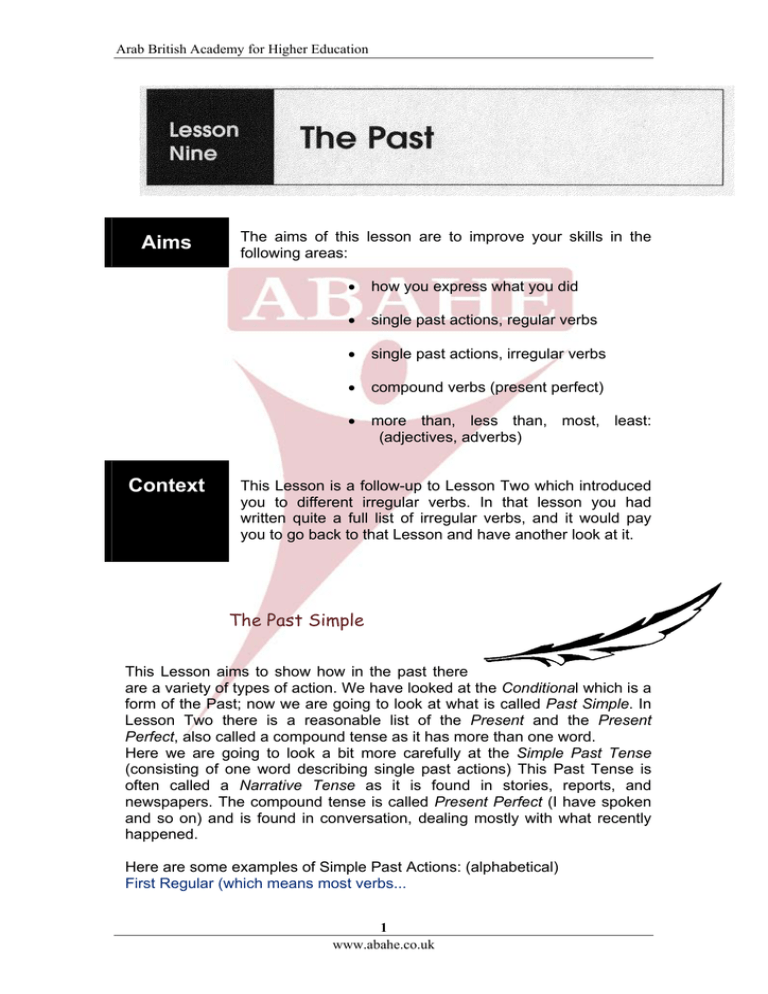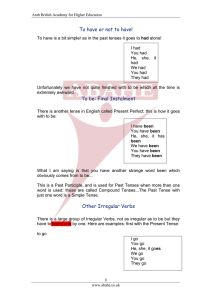
Arab British Academy for Higher Education
Aims
Context
The aims of this lesson are to improve your skills in the
following areas:
how you express what you did
single past actions, regular verbs
single past actions, irregular verbs
compound verbs (present perfect)
more than, less than, most, least:
(adjectives, adverbs)
This Lesson is a follow-up to Lesson Two which introduced
you to different irregular verbs. In that lesson you had
written quite a full list of irregular verbs, and it would pay
you to go back to that Lesson and have another look at it.
The Past Simple
This Lesson aims to show how in the past there
are a variety of types of action. We have looked at the Conditional which is a
form of the Past; now we are going to look at what is called Past Simple. In
Lesson Two there is a reasonable list of the Present and the Present
Perfect, also called a compound tense as it has more than one word.
Here we are going to look a bit more carefully at the Simple Past Tense
(consisting of one word describing single past actions) This Past Tense is
often called a Narrative Tense as it is found in stories, reports, and
newspapers. The compound tense is called Present Perfect (I have spoken
and so on) and is found in conversation, dealing mostly with what recently
happened.
Here are some examples of Simple Past Actions: (alphabetical)
First Regular (which means most verbs...
1
www.abahe.co.uk
Arab British Academy for Higher Education
abandon
abolish
amble
ban
boast
call
cover
dream
open
sew
sow
talk
walk
want
wish
abandoned (one n)
abolished
ambled
banned (2 ns)
boasted
called
covered
dreamed
opened
sewed
sowed
talked
walked
wanted
wished
Now Irregular; please refer to the list in Lesson Two.
PRESENT
To be able
to be
break
bring
come
cut
do
drive
eat
fall
find
give
go
have
hear
know
lead
leave
make
put
say
see
seek
2
www.abahe.co.uk
PAST
was able, could
was
broke
brought
came
cut
did
drove
ate
fell
found
gave
went
had
heard
knew
led
left
made
put
said
saw
Arab British Academy for Higher Education
sought
shut
spoke
took
told
wrote
shut
speak
take
tell
write
You will notice that a number of these verbs are the same in the Past as the
Present e.g. cut, shut, put; also notice the different pronunciation of put and
shut, although the same spelling! What a mass of contradictions English is!
And to work out the actual meaning of any of these verbs, you have to check
the context, as at times the same word is used for different tenses: we will be
having a look at the Imperfect (the descriptive Past Tense) in the next
chapter...
Activity 1
Put the following sentences into the Past Tense: try not to
look up the verb lists but if you have to, do the exercise again
until you can do it unassisted. The Key is at the end of this
Lesson.
a) We often seek, but less often find
b) The best people do not boast of their achievements
c) Is he able to do this exercise? No, he cannot
d)
The farmer does not sow seed in stony ground; he
prefers fertile land
e)
Do you know what this means? Yes, I know it very well
f)
Philip only speaks when he is spoken to
g)
I have £5 left: how much have you got?
h)
Mary cuts the paper with her little scissors
i)
You tell me the truth and I find it unpleasant
All Rights Reserved © Arab British Academy for Higher Education
3
www.abahe.co.uk





